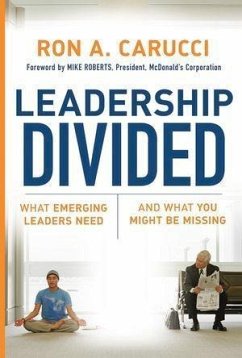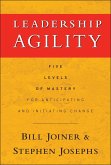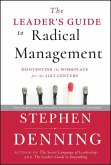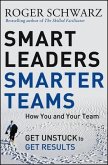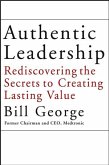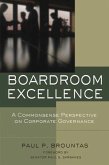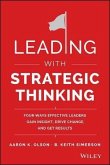Dieser Download kann aus rechtlichen Gründen nur mit Rechnungsadresse in A, B, BG, CY, CZ, D, DK, EW, E, FIN, F, GR, HR, H, IRL, I, LT, L, LR, M, NL, PL, P, R, S, SLO, SK ausgeliefert werden.
According to Carucci, emerging leaders believe that incumbents are self-aggrandizing workaholics and poor role models who often abuse their power. They are perceived as manipulative, Machiavellian, and devoid of emotional intelligence. By contrast, incumbent leaders feel that the emerging generation is overemotional, undisciplined, and puts too much stock in creativity, teamwork, and consensus. Its members lack the true grit needed to lead the workforce through the upheavals of the twenty-first century.
Carucci's stated and laudable intention is to inspire both sides to start a discussion about leadership. Unfortunately, he undermines his project by siding (sometimes naively) with the emerging generation-for instance, quoting with approval a regional manager who says he would want to be remembered "simply, as the man who put a smile on the face of all who he met." We are a long way here from Jack Welch and Lou Gerstner and even Bill Hewlett and Dave Packard. Not that these leaders had all the answers. But the alternative Carucci favors seems so, well, touchy-feely.
Of course, generational differences have been around for a long time. Yet Carucci argues that there is an unusually wide chasm now between generations, which organizations can't ignore. When emerging leaders were asked whether they would refuse a promotion if their bosses' values were at odds with their own, for example, more than 80% said "absolutely." The consequences for management are hardly trivial.
Can anything be done to bridge the gap? Perhaps the best suggestion comes in the foreword by former McDonald's president Mike Roberts. "I know that vulnerability and hurt-and ultimately, loss-contribute to leadership in ways I can't articulate," he writes, after discussing his daughter's cerebral palsy. Incumbent leaders have something important to learn from Roberts's emotional candor, even though it goes against all their instincts: Opening up could make them better leaders and more appealing to their followers.
Many emerging leaders are still too young to understand how hurt can help them temper unfettered openness with emotional restraint. As they learn to do this better, they may become more balanced leaders and more accessible to the incumbents to whom they must relate. If they meet this challenge, emerging leaders may avoid repeating tomorrow the mistakes of the previous generation that they so roundly condemn today." - Diane Coutu (Harvard Business Review, November 2006)

